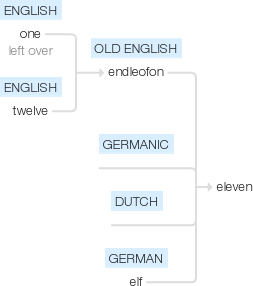Eleven
Old English endleofon, from the base of one + a second element (probably expressing the sense ‘left over’) occurring also in twelve; of Germanic origin and related to Dutch and German elf .
wiktionary
From Middle English elleven, enleven, eleven, from Old English endleofan; from Proto-Germanic *ainalif(“one left”) (i.e., one left over after having already counted to ten), a compound of *ainaz and *-lif, from Proto-Indo-European *leyp-(“leave, remain”). Compare West Frisian alve, Low German ölven, Dutch elf, German elf, Icelandic ellefu, Danish and Norwegian elleve.
etymonline
eleven (adj., n.)
"1 more than ten; the number which is one more than ten; a symbol representing this number;" c. 1200, elleovene, from Old English enleofan, endleofan, literally "one left" (over ten), from Proto-Germanic *ainlif- (compare Old Saxon elleban, Old Frisian andlova, Dutch elf, Old High German einlif, German elf, Old Norse ellifu, Gothic ainlif), a compound of *ain "one" (see one) + from PIE root *leikw- "to leave."
FIREFLY: Give me a number from 1 to 10.
CHICOLINI: eleven!
FIREFLY: Right!
["Duck Soup"]
Viking survivors who escaped an Anglo-Saxon victory were daroþa laf "the leavings of spears," while hamora laf "the leavings of hammers" was an Old English kenning for "swords" (both from "The Battle of Brunanburh"). Twelve reflects the same formation. Outside Germanic the only instance of this formation is in Lithuanian, which uses -lika "left over" and continues the series to 19 (vienuo-lika "eleven," dvy-lika "twelve," try-lika "thirteen," keturio-lika "fourteen," etc.). Meaning "a team or side" in cricket or football is from 1743.
